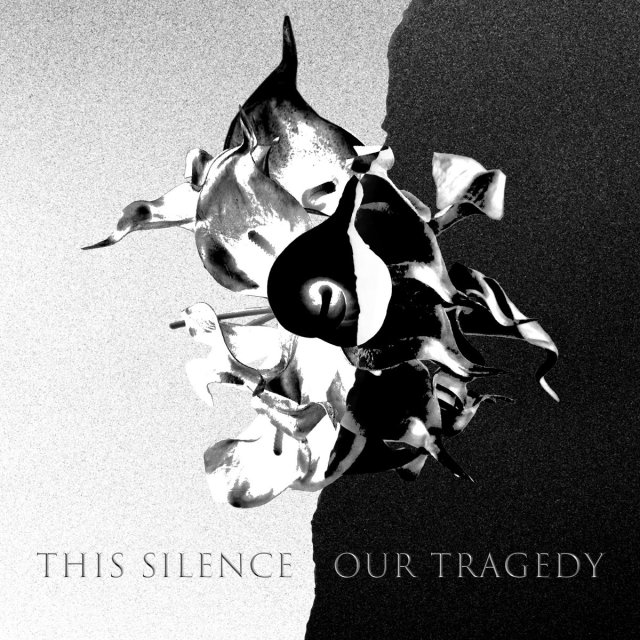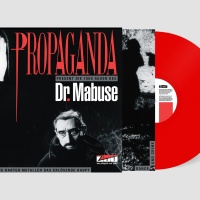So OMD were now sweating bullets for the first time in their musical career. The rise to the top and the consolidating smash third album had been as natural and easy as could be, and yet by 1983 they had run aground after three years; a pretty common run of success as pop music goes. Rare is the band who can maintain hits beyond that “three year hype window.” In an era when Altered Images would break up when their latest single only made it to 46, OMD decided to honor their Virgin contract and soldier on, but not without some big changes.
First on the chopping block? Their self-described “boring bank clerk image.” In the late 70s, there was a Post-Punk vogue for bands that wore simple dress shirts and thin ties. John Foxx kicked this off for his “System Of Romance” look [a.k.a. The Quiet Man] and Ian Curtis of Joy Division picked it up and gave it some more cachet, and by the time that OMD coalesced, they managed to turn what had been an anti-image into a real one. For three years, one could not see photos of the band without the solid dress shirt and thin tie combo. Their fans probably dressed following suit… I know I did! [spoiler alert: I am wearing a solid color dress shirt and a thin tie right now]
When OMD resurfaced in 1984, a year on from “Dazzle Ships” they were like peacocks in comparison in mid-80s designer fashions which probably cost them ten-twenty times their previous wardrobe budget. But in a cutthroat world of bands vying for chart supremacy, much less a dramatic comeback, clothes do make the men.
Next big change? Their songs now had a conventional verse/chorus structure. One of the defining traits of OMD was that many of their songs had instrumental recurring chorus structures. Not only did they have esoteric song themes and subject matter, but they largely eschewed the Tin Pan Alley tradition of verse/chorus/verse/chorus/bridge/chorus. This was an aesthetic compromise more serious than designer fashions.
Stylistically, they were a band with lead synths and little or no guitar. Sometimes Andy would play a bass guitar and at other times he used bass synth in the rhythm bed. By 1984, the writing was on the wall. All manner of bands from their Post-Punk peer group were adding the potential scourge of the mid-80s: a horn section. Elvis Costello + The Attractions, The Stranglers, David Bowie all had them with Duran Duran joining the fray the next year. Sure, sure. Martin Cooper played sax on their debut album, but now they would come to lean on him all the more. This was the era of the MOR sax solo and OMD were looking into it cautiously.
Then came possibly the biggest change: they would now write songs with the word “love” in the lyrics! This had the effect of making the band far less unique in the marketplace in a profound manner. The sense of geeky otherness of the band would gradually dissolve away as they adopted more common subject matter for their songs. With the benefit of hindsight, the pivot point that was the commercial failure of “Dazzle Ships” would come to be the band’s bête noir. I’d go further to say that it defined everything they did from that point onwards.
Next: …But what about the music?







![Chris Cross: 1952-2024 [part 2]](https://postpunkmonk.files.wordpress.com/2024/04/ultravox-cross.jpg?w=200&h=200&crop=1)
![Chris Cross: 1952-2024 [part 1]](https://postpunkmonk.files.wordpress.com/2024/04/chris-cross-waehrend-auftritts-ultravox-leipzig-ja.jpg?w=200&h=200&crop=1)




We are about to enter the dangerous period in OMD’s canon – for me. I was all too acutely aware of the fact that this was a “new” OMD, hell they were OMD, not Orchestral Manoeuvres In The Dark now. They would attract a “teen” audience in America because of some very suspect contracts signed (with the Devil in a Director’s Chair) and I would lose quite a bit of respect for Andy and Paul.
LikeLike
Echorich – You weren’t the only one. It was helpful that Paul Humphreys knew when to throw in the towel before he did further damage, though any song he wrote past “ Never Turn Away” was just as diabolical. I remember feeling particularly let down by his star turns considering that “Souvenir” was possibly my favorite OMD song; a fact which has yet to really change with the passing of decades.
LikeLike
Actually this is where they lost their point and my respect. Sure everyone has to pay their rent for sure but this was just too blatant and boring. As much as I loved the early records the more deeper was my disappointment with them.
Like so many of the early Synth-only combos they started to bring in real instruments and common structures and went backwards into musical mainland and heading for a broader audience.
The real interesting stuff started to happen out of the charts only and the short window when everything seemed possible was closing fast starting in 1983.
LikeLike
Slur – I came up through the late 70s and for me I really appreciated the blending of real and synthetic instruments. That hybridization really speaks to me. So I really appreciated the appearance of real drums along programmed and in particular the reliance on bass guitar by McCluskey on “Junk Culture.” Where they crossed the line was on “ All Wrapped Up” with its full bore soca sound with perhaps a dusting of synthetics hidden away carefully within it. That is tedium for me to listen to. I will take a stand and say that if I wanted to listen to soca music, OMD are among the last humans on earth I’d like to hear it from. Actually, I have exactly the same feelings regarding David Byrne’s solo career! In spades! We listen to this band to hear songs about telephone boxes; let’s face it.
LikeLike
Give them some slack! What the band biography Messages highlights is that despite the massive sales of Architecture and Morality and their hit singles because of the awful contract they signed they earned hardly any money at all. Unbelievably they were both still living with their parents. With the failure of Dazzle Ships the band found themselves in debt to Virgin, hence their desperation to try and get some hits and earn some money. They only finally covered their debts and made a bit of money with the sale of the greatest hits, which was quickly followed up by the band splitting.
LikeLike
Richard Anvil – I recall reading interviews with McCluskey saying how they were still living in the bedrooms they had grown up in! That’s warped. But there’s no shortage of bands willing to sign bad contracts. It happens every day. Didn’t I also hear about Gordon Trollier also taking them to the cleaners somewhere? Recently?
I try to be understanding about the real financial issues affecting bands and to take that into consideration when hearing the oft times horribly compromised music they make to dig themselves out of their rut. At a certain point, I have to stop buying such music. If they are David Bowie [i.e. a world-straddling meta influence] I stop buying it for a worryingly long period. At least they went “ into the black” in only nine years together. That’s pretty great as bands go.
LikeLike